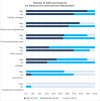Stakeholder priorities for ART initiation and early retention strategies in Malawi: a qualitative study comparing international and national perspectives
- PMID: 40618054
- PMCID: PMC12228217
- DOI: 10.1186/s12889-025-23484-8
Stakeholder priorities for ART initiation and early retention strategies in Malawi: a qualitative study comparing international and national perspectives
Abstract
Introduction: New or returning antiretroviral therapy (ART) clients are largely ineligible for differentiated service delivery (DSD) models. These clients are at increased risk of treatment interruption and may benefit from flexible care models, but stakeholder buy-in may limit progress on interventions for this population. We qualitatively explored stakeholder perceptions and decision-making criteria for scaling DSD models for new or returning ART clients in Malawi.
Methods: We conducted in-depth interviews with internationally-based stakeholders (from foundations, multilateral organizations, and non-governmental organizations (NGOs)) and Malawi-based stakeholders (from the Malawi Ministry of Health and local implementing partners). Interviews included two think-aloud scenarios in which participants rated and described their perceptions of (1) the relative priority of five criteria (cost, effectiveness, acceptability, feasibility, and equity) in determining which interventions to implement for new or returning ART clients and (2) the relative priority of seven potential interventions (monetary incentives, non-monetary incentives, community-based care, ongoing peer/mentor support and counseling, eHealth, facility-based interventions, and multi-month dispensing) for the same population. Interviews were completed in English via video conference and were audio-recorded. Transcriptions were coded using ATLAS.ti version 9. We examined the data using thematic content analysis and explored differences between international and national stakeholders.
Results: We interviewed twenty-two stakeholders between October 2021-March 2022. Thirteen were based internationally and nine were based in Malawi. Both groups prioritized client acceptability, but diverged on other criteria: international stakeholders prioritized effectiveness and Malawi-based stakeholders prioritized cost, feasibility, and sustainability. Both stakeholder groups were most interested in facility-based DSD models such as multi-month dispensing and extended facility hours. Nearly all stakeholders described person-centered care as a critical focus to incorporate into all DSD models.
Conclusions: National and international stakeholders support DSD models for new or returning ART clients. Client acceptability and sustainability should be prioritized to address the concerns of nationally-based stakeholders. Future studies should explore reasons for differences in national and international stakeholders’ priorities and how to ensure that local perspectives are incorporated into funding and programmatic decisions.
Keywords: Differentiated service delivery; HIV treatment; Health systems; Resource-limited settings, stakeholder participation, qualitative research.
Conflict of interest statement
Declarations. Ethics approval and consent to participate: The study was approved by the National Health Science Research Committee (NHSRC) in Malawi and by the University of California Los Angeles Institutional Review Board. All procedures performed in studies involving human participants were in accordance with the ethical standards of the institutional and/or national research committee and with the 1964 Helsinki Declaration and its later amendments or comparable ethical standards. All participants gave informed oral consent before completing an interview. No identifiable information was collected. Consent for publication: Not applicable. Competing interests: The authors declare no competing interests.
Figures
Update of
-
Stakeholder Priorities for ART Initiation and Early Retention Interventions in Malawi: A Qualitative Study Comparing International and National Perspectives.Res Sq [Preprint]. 2023 Dec 21:rs.3.rs-3725505. doi: 10.21203/rs.3.rs-3725505/v1. Res Sq. 2023. Update in: BMC Public Health. 2025 Jul 5;25(1):2388. doi: 10.1186/s12889-025-23484-8. PMID: 38196656 Free PMC article. Updated. Preprint.
Similar articles
-
Stakeholder Priorities for ART Initiation and Early Retention Interventions in Malawi: A Qualitative Study Comparing International and National Perspectives.Res Sq [Preprint]. 2023 Dec 21:rs.3.rs-3725505. doi: 10.21203/rs.3.rs-3725505/v1. Res Sq. 2023. Update in: BMC Public Health. 2025 Jul 5;25(1):2388. doi: 10.1186/s12889-025-23484-8. PMID: 38196656 Free PMC article. Updated. Preprint.
-
Are HIV Treatment Clients Offered a Choice of Differentiated Service Delivery Models? Evidence from Malawi, South Africa, and Zambia.Patient Prefer Adherence. 2025 Jun 25;19:1825-1841. doi: 10.2147/PPA.S494679. eCollection 2025. Patient Prefer Adherence. 2025. PMID: 40585576 Free PMC article.
-
Consumers' and health providers' views and perceptions of partnering to improve health services design, delivery and evaluation: a co-produced qualitative evidence synthesis.Cochrane Database Syst Rev. 2023 Mar 14;3(3):CD013274. doi: 10.1002/14651858.CD013274.pub2. Cochrane Database Syst Rev. 2023. PMID: 36917094 Free PMC article.
-
Optimal monitoring strategies for guiding when to switch first-line antiretroviral therapy regimens for treatment failure in adults and adolescents living with HIV in low-resource settings.Cochrane Database Syst Rev. 2010 Apr 14;(4):CD008494. doi: 10.1002/14651858.CD008494. Cochrane Database Syst Rev. 2010. PMID: 20393969
-
Retention in HIV care between testing and treatment in sub-Saharan Africa: a systematic review.PLoS Med. 2011 Jul;8(7):e1001056. doi: 10.1371/journal.pmed.1001056. Epub 2011 Jul 19. PLoS Med. 2011. PMID: 21811403 Free PMC article.
References
-
- Rosen S, Grimsrud A, Ehrenkranz P, Katz I. Models of service delivery for optimizing a patient’s first six months on antiretroviral therapy for HIV: an applied research agenda [Internet]. Gates Open Research; 2020 [cited 2022 Mar 22]. Available from: https://gatesopenresearch.org/articles/4-116 - PMC - PubMed
Grants and funding
LinkOut - more resources
Full Text Sources



